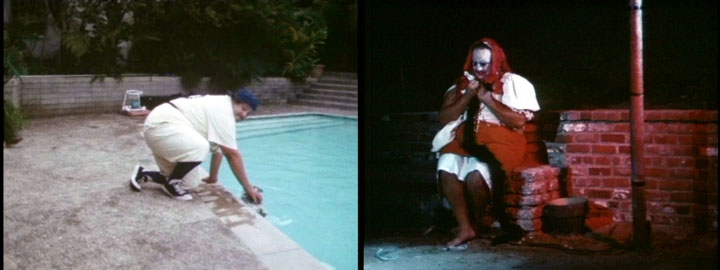Mother (1970) from Johnny Web (Uncle Scoopy; Greg Wroblewski) |
|
Ah bin up 'n down this ol' world some, an' walked to 'n fro upon it a
piece, an ah seen some shit. Prob'ly seen more movies than ol' Roger
Ebert has even heard of, an' ah reckon there's some mighty irregular
shows in the mem'ries, but they ain't many odder 'n this 'un. Law' a'mighty, this is some goofy shit! It is also known as Up Your Teddy Bear and The Seduction of a Nerd. Back around 1970 or so, a fella named Don Joslyn saw that his acting career was stagnating, and decided that he wanted to direct. Before turning out his one and only film, he had to overcome a few problems, like (a) he had no idea how to direct a movie, and (b) if he could have learned how, he wouldn't have had enough money. In fact, to be more specific, he didn't have any money. To his credit, he did not let these minor issues stand in the way of assembling 90 minutes worth of footage featuring Wally "Underdog" Cox, Julie "Catwoman" Newmar, and a popular 350-pound former Shakespearian actor named Victor Buono. Like Newmar, Buono had played a villain (King Tut) on the campy Batman TV series. What a cast! Instead of watching them in a story, I felt like I should have been feeding them softball double-entendre questions.
As Newmar explains in an accompanying interview, it was a fairly simple process for Joslyn to make a film with three name stars and no money. He simply shot in all the locations without permission, and then failed to pay the actors. Any minor actor who is a wannabe director can do the same thing - once. It becomes much harder to hire actors for a second film however. Word travels fast when the checks bounce, or never arrive. Per IMDb, Mr. Joslyn never made another film, and never worked again in any film in any capacity. As for the other expenses involved in making this movie, Newmar didn't know, or at least didn't explain, how Joslyn came up with a camera and film, but I think we can imagine how that might have transpired. The footage he assembled wasn't just random. It even had a plot - or at least a rough outline of a plot - to glue it all together. Catwoman plays "Mother," the ruthless head of a greedy corporate toy manufacturing firm. One day she spots a skillful street busker, a gentle puppet-maker (Wally Cox) whose creations are fascinating to children. Mother decides that she just has to hire this idiot savant to make puppets for her company, but he resists her job offer, so Mother assigns the recruitment task to her grown but infantile son, Skippy (Buono). Skippy's detectives tell him that Underdog spends all of his free time following women around without ever approaching them, so the big fella becomes convinced that he needs a femme fatale to get the ol' Underdog signature on that management contract. The attempts and failures in this seduction process form the meat of the movie. Woman after woman tries and fails, and after each failure Mother berates Skippy for his incompetence. Turns out Underdog won't go for the chicks because he's in love with Mother herself, who reminds him of his own domineering mother. The film doesn't really have a conclusion, Underdog and Skippy show up in mother's office one day, sans contract, so Mother berates Skippy once more. Skippy is finally at the end of this tether from all this abuse, so he grabs Mother's throat and starts choking her. They get involved in a long and violent wrestling match which is somewhere between lovemaking and murder, whereupon Underdog says, "I see you two want to be alone," and closes the door as the end credits roll. I suppose that was the point where the director ran out of film stock. That plot summary seems almost credible by Hollywood standards, and that's really misleading, because the film just seems to meander from scene to scene. It could easily be edited to a five minute short without losing anything important. What makes it so weird? Well sir, the highlights of the film consist of the following:
|
|
Cox:
|
|
Buono:
|
I think you have the flavor. It is the Citizen Kane of Yodeling Porn. I don't know about you guys, but I think it is wonderful that Troma finds obscure crap like this, remasters it, and puts it out on DVD for some quick laughs and quick bucks. It is an atrociously bad film, and yet it possesses a million dollars worth of period memories! I hated it, but I loved it as well. |
|
||||
|
||||


